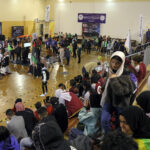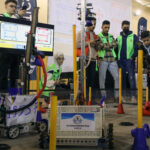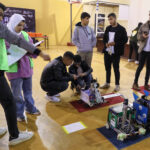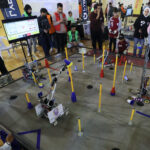Agence France-Presse:
Libyan Youssef Gira, 18, who is obsessed with modern technologies, seeks to encourage his peers to launch initiatives in the field of technology to modernize a country that has long betrayed the creativity of its youth through decades of violence and dictatorship.
In the Al-Sarraj district in the west of the capital, Tripoli, a young student participated in a robotics competition in which about twenty teams, made up of budding scientists, amateur graphic designers and other trainees from all regions, competed in this country divided after years of war and instability in the wake of the 2011 revolution.
“Our goal is to send a message to the entire community that what we have learned has changed many things in us,” Youssef Gira told AFP.
For more than a decade, Libya has witnessed intermittent conflict since the 2011 NATO-backed revolution overthrew leader Muammar Gaddafi, amid conflicts involving various militias and foreign powers, and competition between multiple governments for influence in the country.
Since the overthrow of the Gaddafi regime more than 11 years ago, two governments have competed for power, one in the capital Tripoli (west) recognized by the United Nations, and the other in Sirte (center) led by the strongman in eastern Libya, Field Marshal Khalifa Haftar.
In contrast to the Libyan politicians, the young participants in the competition worked together in the school gymnasium where the competition was held outdoors, with fans who came to support their teams to the beat of enthusiastic songs in English.
Jeera said that he acquired new skills and learned the principles of teamwork to achieve a common goal.
Mohamed Zayed, the coordinator of this event, expressed his conviction that such initiatives could open up “new horizons” for Libya “that are not limited to robots”.
“These young people also had to manage the relations between them and work for integration, unity and peace,” he told AFP after the opening speech in front of stands filled with high school students and their families as well as some officials.
– Industry of the future –
For Mohamed Zayed, it is above all about “preparing workers for the future and raising awareness in the country of the importance of technology and innovation.”
Outside the stadium, about two dozen teams present their mini robots, which also highlights the ability of technology to facilitate the integration, in a deeply conservative society, of often marginalized groups such as women, migrants or people with disabilities.
Shadrowan Khalafallah, 17, embarked on this adventure, seeing technology as a way to help find solutions to climate and health challenges, but also as a way to help girls enhance their role in society.
“We established this team to help society develop and to show that we exist,” she said, by distributing posters bearing the slogan “Change”.
Professor of Biology, Physics and Chemistry Najwa Abdel-Ghani, a teacher in one of the participating teams, believes that technology will contribute to developing the country and “improving its image.”
After 42 years of dictatorship under Muammar Gaddafi, Libyans have witnessed twelve years of political crisis punctuated by violence between the two rival camps.
Residents now hope that the relative calm in recent months will allow them to think about the country’s development.
– ‘Libya lacks nothing’ –
“We tend to receive these ideas from abroad and ask ourselves, ‘Why don’t we develop them ourselves here?'” Najwa Abdel-Ghani, who studied in Britain, told AFP.
The government affirms that youth and technology affairs constitute a major focus in its development plan through “new initiatives” for digitalization, communications, the knowledge economy, training, and even “smart cities”.
For years, Libya has witnessed a great boom in the interest of young people in the field of promising robotics.
“Libya lacks nothing, neither human resources, nor intelligence, nor the determination of the youth,” Tripoli government spokesman Mohamed Hammouda told AFP during the event.
But he added, “What we lack is the sustainability of the stability that Libya enjoys today, in addition to a strategic vision to support the youth.”







